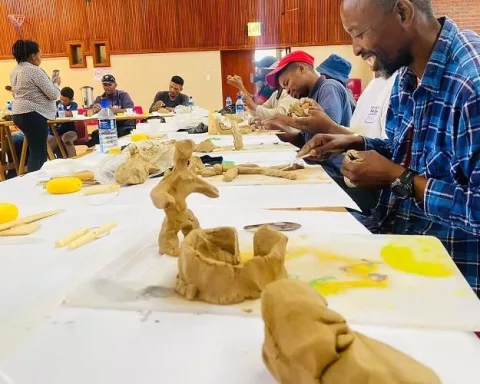The Khuseleka One-Stop Centre is a new establishment within the Saartjie Baartman Centre for Women and Children that offers a range of services for victims of crime and violence, including trauma therapy, legal advice, healthcare, and substance abuse treatment programs. Despite facing challenges in acquiring support and recognition, the centre stands as a beacon of hope and a testament to the fight against gender-based violence and femicide. The inauguration coincided with the signing of the National Council of Gender-Based Violence and Femicide Bill, indicating progress in both policy formulation and practical application.
A Milestone for Victims of Crime and Violence: The Launch of Khuseleka One-Stop Centre
The Khuseleka One-Stop Centre, located within the Saartjie Baartman Centre for Women and Children, offers a range of critical services for women and children who have experienced crime and violence. These services include trauma therapy, psychological support, healthcare, legal advice, and substance abuse treatment programs. The centre’s inauguration signifies progress in the fight against gender-based violence and femicide.
After an almost decade-long battle for recognition, last week marked the launch of the Khuseleka One-Stop Centre, nestled within the Saartjie Baartman Centre for Women and Children. This noteworthy establishment serves as a shining beacon of hope and a robust support system for women and children who have experienced crime and violence. The centre was birthed and nurtured by a non-profit organization that has withstood numerous challenges, remained steadfast, and finally triumphed in its mission to attain national recognition.
A Crusade for Support and Recognition
This life-changing sanctuary was initiated by the Western Cape Department of Social Development (DSD) in 2015. The process of acquiring the essential support from the national Department of Social Development was fraught with difficulties, as stated by Sharna Fernandez, the Western Cape’s Member of the Executive Council (MEC) for social development. Regardless of these obstacles, the provincial DSD maintained its funding for the Khuseleka and Saartjie Baartman centres, underlining its unfaltering dedication to helping victims of crime and violence.
A Multifaceted Service Centre
More than just a refuge, the centre is an all-encompassing support network which offers a range of critical services. These include trauma therapy, psychological support, healthcare, legal advice, and liaison with the police. One of the key features of the centre is its substance abuse treatment program, addressing a significant concern for many victims. The Western Cape DSD’s Victim Empowerment Programme collaborates with numerous partners such as the Saartjie Baartman Centre, the National Prosecuting Authority, the provincial Department of Health and Wellness, and the South African Police Service, to guarantee that survivors receive comprehensive support at Khuseleka.
The inauguration of the Khuseleka One-Stop Centre coincided with the signing of the National Council of Gender-Based Violence and Femicide Bill. Fernandez, despite reservations about the timing of the signing, expressed her approval of this progression. She pointed out that the Provincial DSD has contributed numerous inputs to this Bill over the years and pledged to keep a close eye on the council’s goals and functions.
The Expectations and Challenges Ahead
The council is projected to devise an action plan within six months of its inception, detailing their strategies to combat gender-based violence and femicide. Fernandez echoed the shared anticipation that the council will fulfil its responsibilities as described, and not merely represent another hollow political gesture.
Despite the lengthy battle for recognition and support, the launch of the Khuseleka One-Stop Centre is a testament to the Western Cape DSD’s unwavering support of victims of crime and violence. This inauguration signifies progress in the fight against gender-based violence and femicide, exemplifying the hardiness of those engaged in this daily struggle. As the centre initiates its operations, it stands as both a symbol of victory over hardship and a beacon of hope for those it is designed to assist.
Wrapping Up
In conclusion, the establishment of the Khuseleka One-Stop Centre inside the Saartjie Baartman Centre for Women and Children is a significant milestone in the persistent fight against gender-based violence. It stands as a symbol of resilience, determination, and hope, providing a comprehensive support system for victims. Its inception also represents a significant step in executing the National Council of Gender-Based Violence and Femicide Bill, indicating progress in both policy formulation and practical application. Despite the strenuous and lengthy struggle for recognition, the outcome is a facility that pledges to influence positively and tangibly the lives of its beneficiaries. With the advent of this new centre, the future of support for victims of gender-based violence in Cape Town appears more promising than ever.
1. What services are offered at the Khuseleka One-Stop Centre?
The Khuseleka One-Stop Centre offers a range of critical services for women and children who have experienced crime and violence, including trauma therapy, psychological support, healthcare, legal advice, substance abuse treatment programs, and liaison with the police.
2. Who initiated the Khuseleka One-Stop Centre?
The Khuseleka One-Stop Centre was initiated by the Western Cape Department of Social Development (DSD) in 2015.
3. What were the challenges in acquiring support for the centre?
The process of acquiring the essential support from the national Department of Social Development was fraught with difficulties, as stated by Sharna Fernandez, the Western Cape’s Member of the Executive Council (MEC) for social development.
4. How does the centre collaborate with other organizations?
The Western Cape DSD’s Victim Empowerment Programme collaborates with numerous partners such as the Saartjie Baartman Centre, the National Prosecuting Authority, the provincial Department of Health and Wellness, and the South African Police Service, to guarantee that survivors receive comprehensive support at Khuseleka.
5. What is the significance of the National Council of Gender-Based Violence and Femicide Bill?
The inauguration of the Khuseleka One-Stop Centre coincided with the signing of the National Council of Gender-Based Violence and Femicide Bill, indicating progress in both policy formulation and practical application in the fight against gender-based violence and femicide.
6. What is the future of support for victims of gender-based violence in Cape Town?
With the advent of the Khuseleka One-Stop Centre, the future of support for victims of gender-based violence in Cape Town appears more promising than ever.












